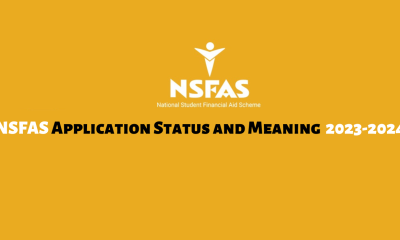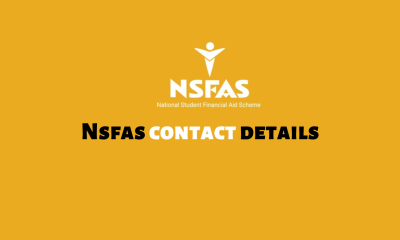NSFAS News
Will NSFAS Fund Me Next Year? NSFAS Funding and Requirements

Will NSFAS Fund Me Next Year? NSFAS Funding and Requirements. The National Student Financial Aid Scheme (NSFAS) plays a vital role in providing financial support to eligible South African students pursuing higher education. Whether you are studying at a university or a Technical and Vocational Education and Training (TVET) college, understanding the funding requirements and conditions is essential for ensuring continued support from NSFAS. If you’re wondering, “Will NSFAS fund me next year?” here’s everything you need to know about NSFAS funding policies and how you can qualify.
Will NSFAS Fund Me Next Year?
Yes, that is true. As per NSFAS’ policy, to maintain their bursary funding, students must pass at least 50% of their modules and meet their university/TVET’s basic passing requirements.
NSFAS Funding Requirements
NSFAS provides financial assistance to students who need support to pay for their tuition, accommodation, books, and other essential living expenses while pursuing their studies. However, receiving this support comes with specific eligibility criteria and requirements, especially concerning academic performance.
1. Minimum Academic Requirements for NSFAS Funding
To ensure that your NSFAS funding continues from one year to the next, you must meet the following minimum academic performance requirements:
- Pass Rate: According to NSFAS‘s policy, you must pass at least 50% of your modules each semester to remain eligible for funding in the next academic year.
- University/TVET Requirements: In addition to passing 50% of your modules, you must also meet the basic passing requirements set by your university or TVET college. This may include meeting the criteria for the number of credits required for progression, as specified by your institution.
If you fail to meet these academic conditions, there is a risk of losing your funding for the following year, as NSFAS generally only supports students who are progressing academically.
2. Academic Progression and Retention of Funding
Maintaining a satisfactory academic record is crucial for keeping your funding. Students who fail to meet the 50% pass rate in their modules or do not meet the institution’s progression criteria may lose their NSFAS support. This highlights the importance of staying on top of your studies and seeking assistance when needed to ensure you can meet the required academic standards.
If you’re facing challenges with your studies, it is highly recommended to:
- Seek academic support: Many universities and TVET colleges offer tutoring services and academic counseling to help students improve their performance.
- Stay organized: Effective time management and a well-organized study plan can help you meet academic requirements.
- Utilize student resources: Don’t hesitate to ask for help from student services, financial aid offices, or peer support networks if you’re struggling academically.
NSFAS Funding Conditions for TVET Students
For students attending TVET colleges, the funding conditions are largely similar, though some differences may apply depending on the level of the program (e.g., Nated programs, apprenticeships). TVET students must meet:
- Program-Specific Requirements: You must also meet the requirements specific to your program to maintain funding eligibility.
- Progression Criteria: As with universities, TVET colleges may have additional academic criteria for progression. Ensure that you meet these standards to continue receiving funding from NSFAS.
3. Academic Renewal and Funding Extensions
In cases where students fail to meet the academic requirements, NSFAS offers options such as academic renewal or an extension of funding, depending on the circumstances. This can provide an opportunity for students to reapply and continue their studies with the financial support needed.
However, NSFAS will typically expect students to show significant improvement in their academic performance if given an extension or renewal.
Can I Apply for NSFAS Again if I Fail to Meet the Requirements?
If you fail to meet the academic requirements one year, it may still be possible to receive NSFAS funding in subsequent years, but it will depend on:
- The Reason for Poor Performance: If your poor academic performance was due to factors beyond your control, such as illness or personal issues, you may be able to appeal the decision and have your funding reinstated.
- Appeal Process: NSFAS has a formal appeals process for students who have lost funding. If you believe that you were unfairly penalized, you can submit a letter or an online appeal for consideration.
It’s essential to provide relevant supporting documentation when appealing the funding decision.
NSFAS Funding Eligibility Criteria
| Criteria | Requirement |
|---|---|
| Minimum Pass Rate | At least 50% of modules passed each semester. |
| Institutional Requirements | Meet the basic passing requirements set by your university or TVET college. |
| Appeals Process | Available for students who fail to meet academic standards due to extenuating circumstances. |
| Academic Progression | Must progress according to your institution’s guidelines and NSFAS’s requirements. |
What Happens If I Don’t Meet the Requirements?
Failing to meet the required academic standards can have serious consequences, such as:
- Loss of Funding: If you don’t meet the 50% pass rate or the university’s requirements, you may lose your NSFAS funding for the next year.
- Delay in Studies: Losing funding could lead to a delay in your studies, as you may need to find alternative financial support or wait until the next academic year to reapply.
How to Ensure Continuous NSFAS Funding
To avoid the risk of losing your funding, consider the following strategies:
- Regularly Check Your Academic Performance: Keep track of your grades and academic standing throughout the year to ensure that you’re on track to meet the requirements.
- Engage with Support Services: If you’re struggling academically, seek assistance early from academic advisors, tutors, or counselors.
- Use Your Resources: Make use of any resources your institution offers to help you improve your performance, including libraries, workshops, and academic support centers.
Conclusion
The key to maintaining NSFAS funding for the next year lies in meeting the required academic standards. By staying on top of your studies and taking advantage of available resources, you can ensure that you continue receiving the financial support you need. Always remember that NSFAS funding is there to help students in need, but it comes with expectations regarding academic performance. Stay focused, stay disciplined, and take proactive steps to meet both your academic goals and funding requirements.
-

 blog1 year ago
blog1 year agoNSFAS Application Status and Meaning 2023-2024
-

 sassa3 months ago
sassa3 months agoYou Can Now Apply for a Basic Income Grant of R999
-

 sassa3 months ago
sassa3 months agoFinally New Grant of R999 for Basic Income Introduced
-

 sassa3 months ago
sassa3 months agoGood News New Grant of R999 for Basic Income Introduced
-

 sassa1 year ago
sassa1 year agoYou Received Sassa Grant Old Age Pension Payments
-

 blog3 months ago
blog3 months agoNsfas contact details – How to Contact NSFAS 2025-2026
-

 sassa3 months ago
sassa3 months agoNew Verification Method for SRD R350 Grants From Sassa
-

 NSFAS News2 months ago
NSFAS News2 months agoRegistering your accommodation properties with NSFAS


